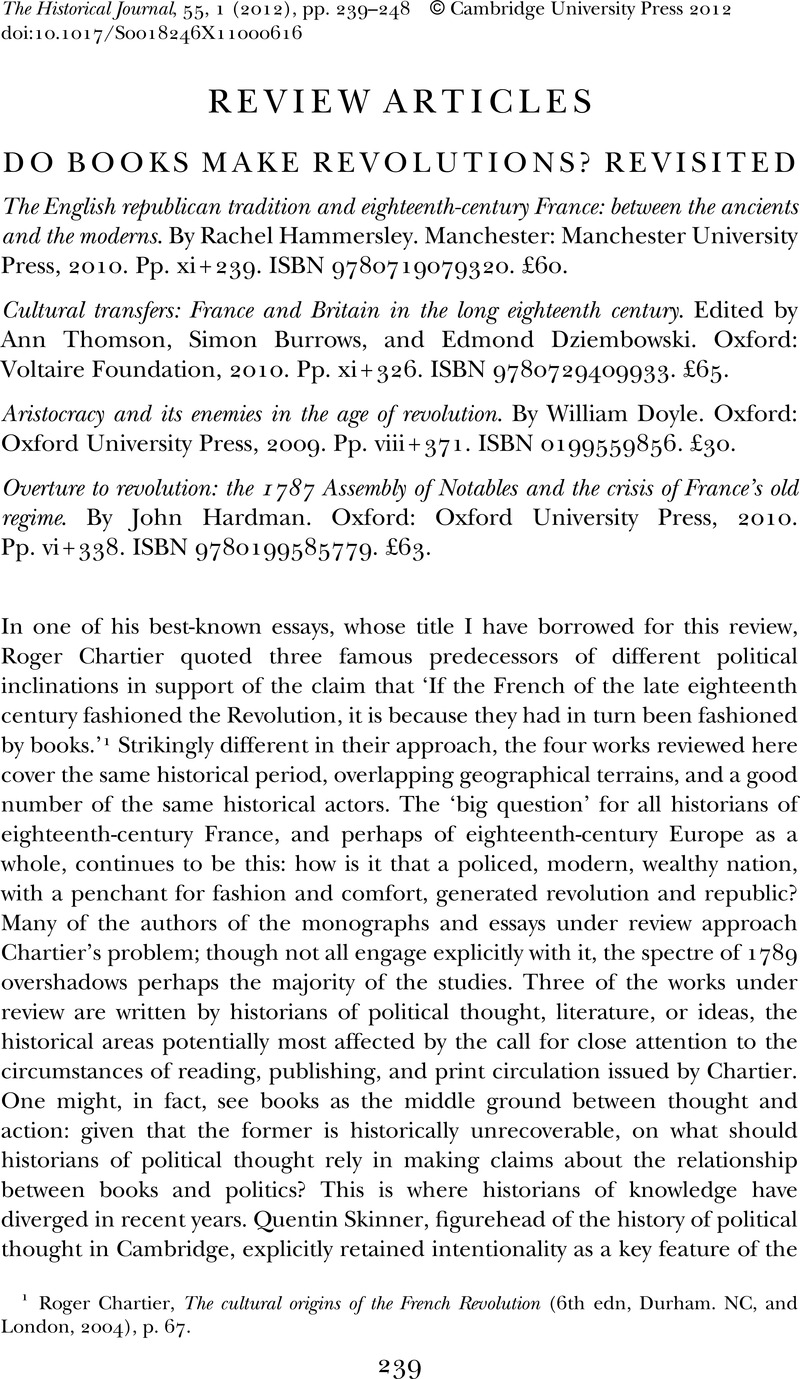No CrossRef data available.
Published online by Cambridge University Press: 10 February 2012

1 Chartier, Roger, The cultural origins of the French Revolution (6th edn, Durham. NC, and London, 2004), p. 67Google Scholar.
2 For a summary of the discussion over this issue, see Bowsma, William J., ‘Intellectual history in the 1980s: from history of ideas to history of meaning’, Journal of Interdisciplinary History, 12 (1981), pp. 279–90CrossRefGoogle Scholar; Toews, John E., ‘Review: intellectual history after the linguistic turn: the autonomy of meaning and the irreducibility of experience’, American Historical Review, 92 (1987), pp. 879–907CrossRefGoogle Scholar.
3 Suleiman, Susan R. and Crosman, Inge, eds., The reader in the text: essays on audience and interpretation (Princeton, NJ, 1980)CrossRefGoogle Scholar; Fish, Stanley, Is there a text in this class? The authority of interpretative communities (Cambridge, MA, 1980)Google Scholar; taken up by, for example, Johns, Adrian, The nature of the book: print and knowledge in the making (Chicago, IL, 1998)CrossRefGoogle Scholar.
4 Teodora Shek Brnardić, ‘Modalities of enlightened monarchical patriotism in the mid-eighteenth century Habsburg monarchy’, in Balázs Trencsényi and Márton Zászkaliczky, eds., Whose love of which country? composite states, national histories and patriotic discourses in early modern east central Europe (Leiden, 2010), pp. 631–61.
5 See Simon Burrows, ‘The Courier de l'Europe as an agent of cultural transfer (1776–1791)’, in Thomson et al., eds., Cultural transfers, pp. 189–202, at 199.
6 Kley, Dale Van, The Jansenists and the expulsion of the Jesuits from France, 1757–1765 (New Haven, CT, and London, 1975)Google Scholar.
7 Burrows, Simon, A king's ransom: the life of Charles Thèveneau de Morande, blackmailer, scandalmonger and master-spy (London, 2010)Google Scholar.
8 Initially in Darnton, Robert, ‘The high enlightenment and the low-life of literature in pre-revolutionary France’, Past and Present, 51 (1971), pp. 81–115CrossRefGoogle Scholar; but see his more recent edited collection with Schlup, Michael, Le rayonnement d'une maison d’édition dans l'Europe des Lumières: la Société typographique de Neuchâtel, 1769–1789 (Neuchâtel and Hauterive, 2005)Google Scholar.
9 Standard works in this area include Bonnat, Jean-Louis and Bossis, Mireille, eds., Ecrire, publier, lire: les correspondances (Nantes, 1983)Google Scholar; Chartier, Roger, Boureau, Alain, and Dauphin, Cécile, eds., Correspondence: models of letter-writing from the middle ages to the nineteenth century (Cambridge, 1997)Google Scholar. In the history of science, a key publication was Latour, Bruno, ‘Visualization and cognition: thinking with eyes and hands’, Knowledge and Society, 6 (1986), pp. 1–40Google Scholar, an approach taken up by, among others, David Philip Miller, ‘Joseph Banks, empire, and “centres of calculation” in late Hanoverian London’, in idem and Peter Hanns Reill, eds., Visions of empire: voyages, botany, and representations of nature (Cambridge, 1996), pp. 21–37; Dirk Stemerding, Plants, animals and formulae: natural history in the light of Latour's Science in Action and Foucault's The Order of Things (Enschede, 1991). I summarize subsequent developments in E. C. Spary, ‘Botanical networks revisited’, in Regina Dauser, Stefan Hächler, and Michael Kempe, eds., Wissen im Netz: Botanik und Pflanzentransfer in europäischen Korrespondenznetzen des 18. Jahrhunderts (Berlin, 2008), pp. 1–18.
10 See Spary, E. C., Utopia's garden: French natural history from Old Regime to Revolution (Chicago, IL, 2000), ch. 2CrossRefGoogle Scholar.
11 The Voltaire Foundation has specialized in such work. See, in particular, Labrousse, Élisabeth, Conscience et conviction: études sur le XVIIe siècle (Paris and Oxford, 1996)Google Scholar; Magdelaine, Michelle, ed., De l'humanisme aux lumières: Bayle et le Protestantisme: mélanges en l'honneur d'Élisabeth Labrousse (Paris and Oxford, 1996)Google Scholar.
12 Baker, Keith Michael, Inventing the French Revolution (Cambridge, 1990), pp. 167–99CrossRefGoogle Scholar.
13 Charlier, Gustave and Mortier, Roland, Une suite de l'Encyclopédie: le Journal encyclopédique (1756–1793): notes, documents, et extraits réunis (Paris, 1952)Google Scholar. A facsimile edition of this journal followed: Journal encyclopédique (76 vols., Geneva, 1967), along with an index by Lenardon, Dante, Index du Journal encyclopédique, 1756–1793 (Geneva, 1976)Google Scholar, making this one of the most accessible of eighteenth-century French-language journals.